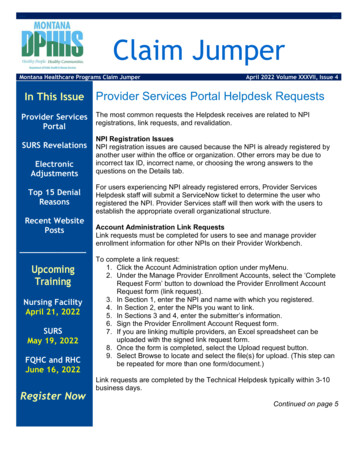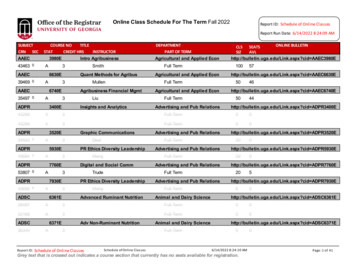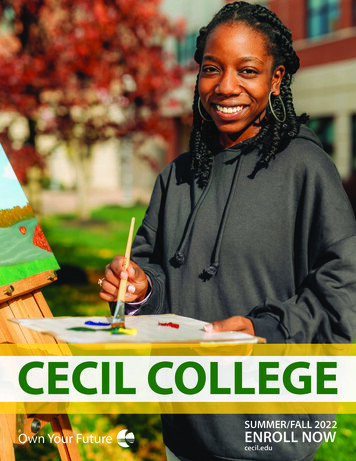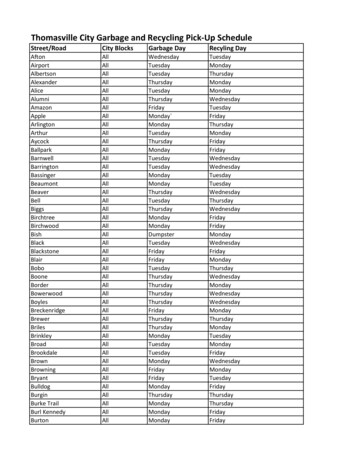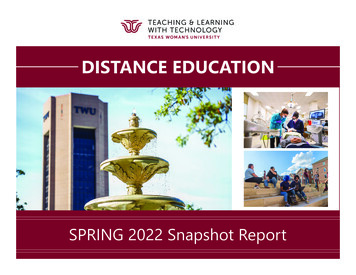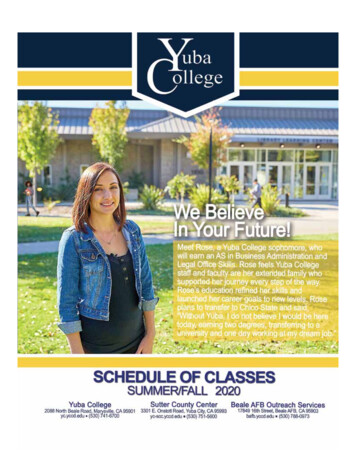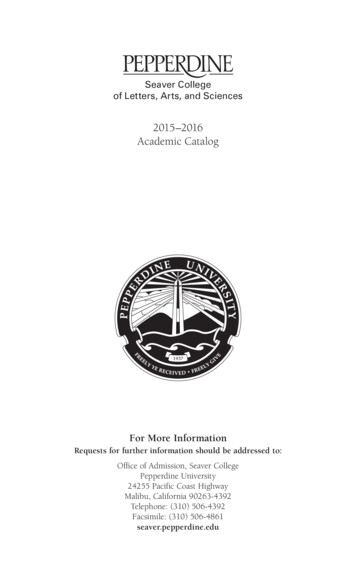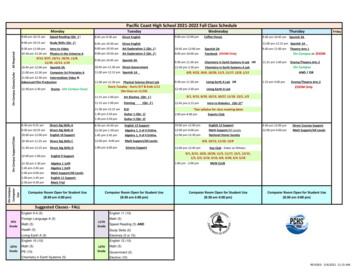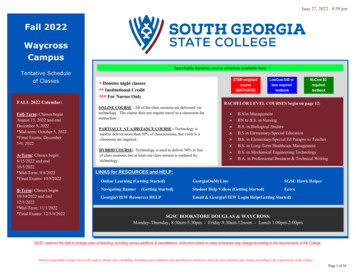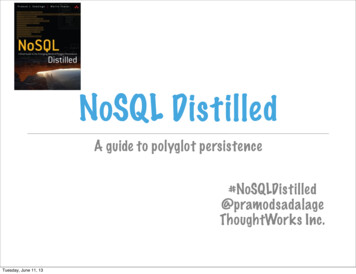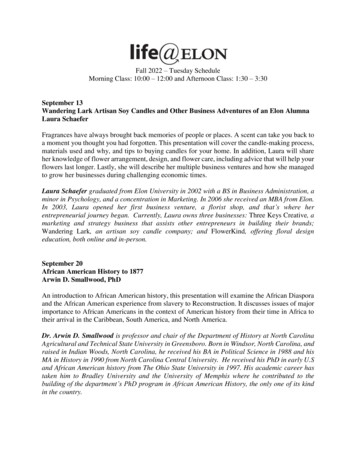
Transcription
Fall 2022 – Tuesday ScheduleMorning Class: 10:00 – 12:00 and Afternoon Class: 1:30 – 3:30September 13Wandering Lark Artisan Soy Candles and Other Business Adventures of an Elon AlumnaLaura SchaeferFragrances have always brought back memories of people or places. A scent can take you back toa moment you thought you had forgotten. This presentation will cover the candle-making process,materials used and why, and tips to buying candles for your home. In addition, Laura will shareher knowledge of flower arrangement, design, and flower care, including advice that will help yourflowers last longer. Lastly, she will describe her multiple business ventures and how she managedto grow her businesses during challenging economic times.Laura Schaefer graduated from Elon University in 2002 with a BS in Business Administration, aminor in Psychology, and a concentration in Marketing. In 2006 she received an MBA from Elon.In 2003, Laura opened her first business venture, a florist shop, and that’s where herentrepreneurial journey began. Currently, Laura owns three businesses: Three Keys Creative, amarketing and strategy business that assists other entrepreneurs in building their brands;Wandering Lark, an artisan soy candle company; and FlowerKind, offering floral designeducation, both online and in-person.September 20African American History to 1877Arwin D. Smallwood, PhDAn introduction to African American history, this presentation will examine the African Diasporaand the African American experience from slavery to Reconstruction. It discusses issues of majorimportance to African Americans in the context of American history from their time in Africa totheir arrival in the Caribbean, South America, and North America.Dr. Arwin D. Smallwood is professor and chair of the Department of History at North CarolinaAgricultural and Technical State University in Greensboro. Born in Windsor, North Carolina, andraised in Indian Woods, North Carolina, he received his BA in Political Science in 1988 and hisMA in History in 1990 from North Carolina Central University. He received his PhD in early U.Sand African American history from The Ohio State University in 1997. His academic career hastaken him to Bradley University and the University of Memphis where he contributed to thebuilding of the department’s PhD program in African American History, the only one of its kindin the country.
He is the author of several books and articles as well as archived papers. His research primarilyfocuses on the relationships between African Americans, Native Americans and Europeans inEastern North Carolina during the Colonial and early Antebellum period. He also works onmapping African American, Native American, and Early American history in order to illustrateearly historical interactions between the three groups and as a means of teaching history to alllevels, including K-12.The recipient of numerous awards, fellowships, and grants, including the National Endowment forthe Humanities African American Research Fellowship, Dr. Smallwood has participated in theaward-winning UNC-TV film documentary, “The Birth of a Colony: North Carolina.” He alsoserves as the current President of the Historical Society North Carolina, member of the ExecutiveCouncil and chair of the Academic planning committee for the Association for the Study of AfricanAmerican Life and History. He is on several boards, including the Board of Directors for theCharlotte Hawkins Brown Museum.September 27How Diversity Can Heal Racial DivisionPaul Herron, PhDDr. Herron grew up as a sharecropper in racially segregated Mississippi. When he was 8 years old,he read and heard about the torture and murder of another Black boy, 14-year-old Emmitt Till, bytwo white men on another plantation. When he was 19, he moved to a diverse and inclusivecommunity in Michigan and flourished, earning a Ph.D. from Michigan State University andbecoming a neuroscientist. Dr. Herron will discuss how the torture and murder of Emmitt Till andthe culture that permitted it damaged his brain, genes, and behavior whereas living in a culture ofdiversity and inclusion stimulated his brain and made him smarter.Dr. Paul Herron earned a BS in Chemistry, an MS in Psychology, and a PhD in Psychology andNeuroscience from Michigan State University. He did postdoctoral studies at the University ofNew South Wales in Sydney, Australia, and at McGill University in Montreal, Quebec. He startedhis academic career at the University of Massachusetts, Amherst, and retired from the Universityof Tennessee Health Science Center in Memphis as a professor. Dr. Herron has conductedneuroscience research on the diversity of mammalian brains, learning, and memory.October 4Der Fuhrer’s Face: World War II Music and Popular CultureJo Ann Williford, MAThroughout the nineteenth and twentieth centuries wars have inspired music, both vocal andorchestral. This class combines lecture with music and popular culture to examine major themesof World War II: military, social, and political.Jo Ann Williford has a BA in History and teacher certification from Meredith College and a MAin American History from UNC Greensboro. She worked for over thirty years at the Office of2
Archives and History, most of them as an educator, including nine years as Education Coordinatorfor the State Capitol Building. Her last fifteen years were spent as state coordinator for NationalHistory Day in North Carolina, an in-school academic program for students in grades 6-12. Ms.Williford has also taught in the Osher Lifelong Institute at North Carolina State.October 11The Aging Process: More Than Shrinking and CreakingRobert M. Palmer, MDIn this interactive class, Dr. Palmer will pose Socratic questions to the audience before informingthem of the answer, e.g., "Why were there no 60-year-olds competing in the winter Olympics thisyear?" or "What are antioxidants and why are they important components of our diet as we age?""Your spouse forgot your anniversary? Is that normal for a 70-year-old person or is this a sign ofAlzheimer's dementia?” After finishing his slide show, he will open the discussion up for questionsfrom the audience. His practice is to keep the answers short and focused and to avoid going intolong answers to questions of participants dealing with personal/family health questions. Expect tolearn lots of great information on aging!Dr. Robert M. Palmer is Professor Emeritus in the Department of Internal Medicine at EasternVirginia Medical School (EVMS). He obtained his undergraduate and medical school degrees atthe University of Michigan. His internal medicine residency was completed at the Los AngelesCounty-USC Medical Center. He attained an MPH (Master of Public Health) and later aGeriatrics fellowship at UCLA. His distinguished career has included appointments at OregonHealth and Sciences University and Case Western Reserve School of Medicine. He spent fourteenyears as the section head of Geriatric Medicine at the Cleveland Clinic, before moving to theUniversity of Pittsburgh where he was vice-chair of Medicine and clinical director of GeriatricMedicine. He was director of the Glennan Center for Geriatrics and Gerontology at EVMS fornearly ten years.Dr. Palmer has attained national and international recognition for his research and clinicalexpertise related to efforts to improve clinical outcomes of hospitalization of older adults. Dr.Palmer is the author of numerous publications and is associate editor of the Journal of theAmerican Geriatrics Society (AGS). His contributions to academic geriatrics have beenrecognized by the AGS with awards that include the prestigious Edward Henderson Award in2015.October 18The Art of Puppet Fabrication for MoviesKathi ZungIf you've ever seen a stop-motion animation movie or commercial, you may not realize there is ateam of puppet fabricators that create that world of characters who are brought to life. One studio,Standing Figure, is located in Graham, North Carolina and it has made puppets for mainstreammovies, Amazon, and MTV. This presentation shows the entire process of how a puppet istransformed from a 2-dimensional drawing on paper, into an articulated, animatable, camera-ready3
model. It will talk about the challenges faced in adapting to the shift from analog animation todigital over the years. The lecture will include many examples of the vast amount of work thatgoes into creating the puppets, and cover the creative side of commercial art.Kathi Zung is a stop-motion animation puppet fabricator with scientific knowledge of mixing andmeasuring chemicals for mold-making, casting resins, epoxies, polymers, foam latex, andsilicone. Her many award-winning film credits include: Kubo and the Two Strings, The Boxtrolls,Paranorman, Tumble Leaf, Celebrity Deathmatch and many others. She is now working on threeupcoming projects, the feature length films, Pinocchio and Weatago Wars, and the Netflix series,Wendell and Wylde.October 25Lewis Carroll: Formed by FaithCharlie Lovett, MFAAuthor of the recently published book Lewis Carroll: Formed by Faith, Charlie Lovett willexamine the role of religion in the life of the author of Alice in Wonderland. He will discuss theimportance of setting historical figures in the proper context, explore the influence of Carroll’sfather and early schoolmasters, and discuss how his faith permeated all aspects of his life, from hischildren’s books to areas such as logic and photography. The class will draw on extensive newresearch and will address how we can look at familiar figures in new ways.In addition to being a gifted writer and scholar, Charlie is a witty, animated, and engaging speaker.As LIFE@Elon program participants, we join a noteworthy group of learners, as Charlie haslectured on Lewis Carroll in the United States and Europe at places such as the SmithsonianInstitution, Harvard University, UCLA, and Oxford University. In 2015 – the 150th anniversaryof the publication of Alice’s Adventures in Wonderland – he curated a major exhibit entitled AliceLive! at The New York Public Library for the Performing Arts, Dorothy and Lewis B. CullmanCenter in Lincoln Center.Charlie Lovett, born in Winston Salem in 1962, was educated at Summit School, Woodberry ForestSchool (Virginia), Davidson College (North Carolina), and in 1997 received his MFA in Writingfrom Vermont College of Fine Arts. He is an author and an educator who, as Writer-in-Residenceat Summit School, wrote children’s plays; nineteen of them having been published and seen inover 3,500 performances in all 50 states and 20 foreign countries. His work includes three majorbest-selling novels, a Christmas book and five books about Lewis Carroll.As an antiquarian book collector, he has amassed a collection of rare (and not so rare) books andother materials relating to Lewis Carroll, author of Alice’s Adventures in Wonderland, with hismost prized item being Lewis Carroll’s own 1888 typewriter! He has served as president of theLewis Carroll Society of North America and editor of the London based Lewis Carroll Review.4
November 1Preserving Family Food History: Writing a Family CookbookDebbie MooseWhen favorite family recipes are lost, so are pieces of history. Through discussion, exercises, andexamples, we talk about how to find and put together family recipes and why that's important.Talking about food is also a good way to learn about family genealogy. If class members havestarted projects, they're welcome to bring them.Debbie Moose is a veteran journalist, former food section editor and author of seven cookbooks,as well as a life-long North Carolinian. She is a graduate of the University of North Carolina atChapel Hill School of Journalism and Mass Communication. Her work has appeared in SouthernLiving, Midwest Living, the Atlanta Journal-Constitution, the Dallas Morning News, Our State,Edible Piedmont, “Cornbread Nation” and other publications. Throughout her writing career, shehas enjoyed discovering the state’s wonderful food, great cooks, and traditions. She brings herknowledge of and passion for the Tar Heel State to others, with a large dollop of humor.November 8The Burlington Boys Choir: History and PracticeWilliam Allred, DMAThis talk will cover the establishment of the boys’ choir, its early accomplishments and travels,and its founding director, Eva Wiseman. Ranging in age from nine to fourteen, the boys in thechoir are chosen not only for their musical ability, but also for their character and academicstanding. The choir has traveled extensively abroad and in the United States, including severaltrips to the White House, and has performed in several operas and oratorios. In addition toexplaining how the young men are recruited and what is learned in rehearsals, the presentation willinclude a recent concert video.Dr. William Allred is only the second director in the choir’s history and has been with the choirfor twenty-five years. He holds a Doctorate of Musical Arts in Choral Conducting from theUniversity of North Carolina in Greensboro, a MA in Orchestral Conducting from the NorthCarolina School of the Arts, and a BA from Westminster Choir College in Princeton, New Jersey.Dr. Allred also serves as the Director/Organist at the Guilford Park Presbyterian Church inGreensboro and volunteers as director of the resident handbell choir at Friends Homes, Guilford.November 15An Introduction to SocratesStephen Bloch-Schulman, PhDSocrates' influence on Western philosophy is impossible to overestimate. In this presentationStephen Bloch-Schulman will lead a discussion and examination of who Socrates was and whathis work as a philosopher means. This will also raise essential questions about the relationshipbetween ethics, knowledge, and power.5
Dr. Stephen Bloch-Schulman is professor and chair of Philosophy at Elon. The recipient of theDaniels-Danieley Award for Excellence in Teaching at Elon in 2018, he has taught the AncientPhilosophy upper-level class at Elon more than a dozen times. He was also the inaugural winnerof the Prize for Excellence in Teaching Philosophy, sponsored by the American PhilosophicalAssociation, the American Association of Philosophy Teachers, and the Teaching PhilosophyAssociation. Dr. Bloch-Schulman has twice won the Lenssen Prize, granted for the best articleabout teaching philosophy over the two-year period prior to the award. His and Elon Universitycolleague Dr. Anthony Weston's recent book, Thinking Through Questions, is an exploration ofthe meaning of questions, how to categorize them, and how to get to better questions (and rejectthose that are problematic).November 29A Life in LanguagesLara Olson, DMALanguage frames the concepts we use to understand and talk about our World and ourselves butdo those concepts express different realities from one language to another? Can speaking anotherlanguage make you feel like a different person? The presenter, who speaks three languages besidesEnglish (and is working on a fourth), will explore these possibilities through personal experience,data from linguistic research, and anecdotes of other multi-linguists.Dr. Lara Olson’s first “foreign language” is music, which she began to study in childhood, andcontinued through her Doctorate in Musical Arts degree. She also speaks French and Italian,living abroad as she continued her musical studies, and Thai, which she learned in her PeaceCorps service (2010-2012). Her latest linguist challenge is Ukrainian, and she enjoys helpingothers learn English as an ESL tutor.December 6Activists & Communal Havens: The Negro Motorist Green Book and African AmericanLocal HistoryLisa R. Withers, MA (PhD Candidate)The Negro Motorist Green Book was a guide published from 1936-1966 to help AfricanAmericans travel with limited encounters of racial discrimination commonly experienced duringthe Jim Crow era. The booklet included over 300 locations in North Carolina where AfricanAmerican travelers could safely seek food, gas, and other accommodations. This presentationexplores how the national narrative of the Green Book intersects with African American localhistory by examining various North Carolina listings along US Highway 70 & US Highway 29.The presentation will focus on the people associated with these listings, who were oftencommunity activists fighting locally for economic and civil rights.Lisa R. Withers is a doctoral candidate in the History Department at North Carolina StateUniversity, where she is currently working on a dissertation entitled “The Negro Motorist GreenBook and African American Community History.” Lisa earned a BA in African & Afro-AmericanStudies with a History minor from the University of North Carolina at Chapel Hill and a MA in6
History with a Museum Studies concentration from the University of North Carolina atGreensboro. Her professional experiences include working in university archives, historic housemuseums, historic sites, local history museums, and teaching undergraduate history surveycourses.Presenters and topics for the weekly classes are subject to change.Classes cancelled for any reason will not be made up and no refund will be given.7
African American History to 1877 Arwin D. Smallwood, PhD An introduction to African American history, this presentation will examine the African Diaspora . team of puppet fabricators that create that world of characters who are brought to life. One studio, Standing Figure, is located in Graham, North Carolina and it has made puppets for .
